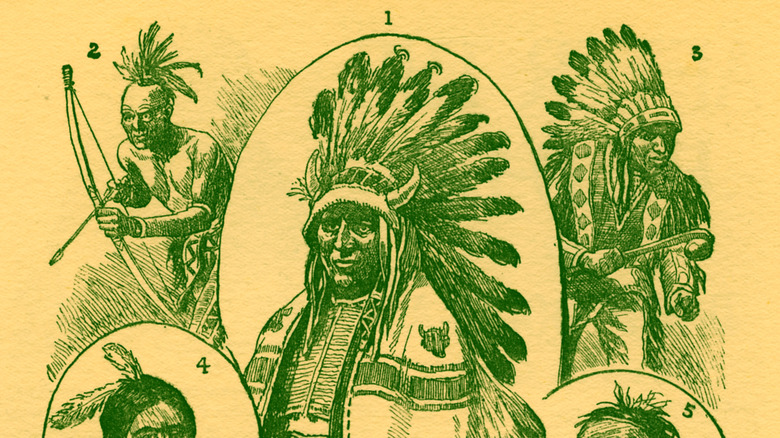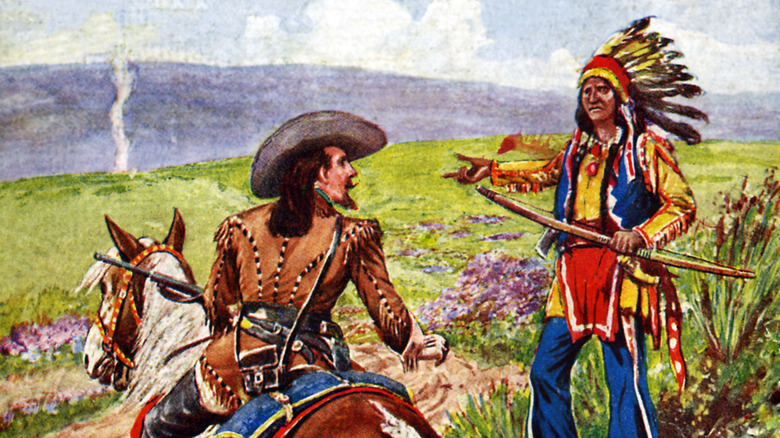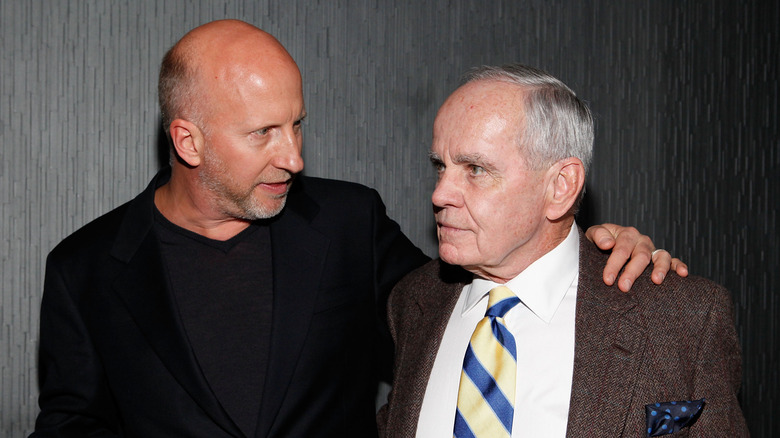Why Cormac McCarthy's Brutal Western Novel May Never Make It To The Big Screen
It's a blood-splattered symphony of violence that book lovers across the world have held in high esteem for decades. When Cormac McCarthy published "Blood Meridian: Or the Evening Redness in the West" in 1985, he changed the landscape of Western narratives forever (per Good Reads). The novel is a fearless venture into the unabashed depravity of a world primordial and harrowing — one whose true historical nature has been subverted by fictional renditions for generations. True, there's nothing wrong with a good action-packed, gun-slinging hero's journey where justice is delivered through a smoking barrel, and a tip of the rancher's hat, but the fact of the matter is that things didn't always look like that in the American West.
Human rights were essentially obsolete, and there were death-swept prairies, frontiers, and deserts alike in forms so barbaric and malevolent, it's hard to face the reality of it even now. "Blood Meridian," the book William Dalrymple once called "the Great American Novel," charges itself with the task of revealing that sickly underbelly of the past through poetic storytelling and literary tactfulness. Following the massive cinematic success of "No Country for Old Men," people were hungry to see more of Cormac McCarthy's work translated to the big screen. Naturally, sights were set on "Blood Meridian." However, the sweeping consensus amongst literary gurus and Hollywood bigwigs alike is essentially the same: Making it into a movie could very well be impossible.
What is 'Blood Meridian' about?
Following the Mexican-American war, vagabonds and outcasts were strewn across the American west in rugged turmoil. "Blood Meridian's" main character, known only as The Kid, sets out on his own at the age of 14 to brave the world in all its unforgiving chaos. Through a series of misfortunes that nearly cast him over the threshold of death, he ultimately takes up with a gang of blood hunters commissioned by the Mexican government to collect Apache scalps and rid the border of their presence. Led by crazed captain John Joel Glanton and an enigmatic madman by the name of Judge Holden, the Glanton Gang sets out on a conquest of terror and gore that leaves a scorched earth in its diabolical wake.
At $50 a scalp, their lucrative odyssey of blood and mayhem reigns without hinderance until they start besieging peaceful Mexican villages and become outlaws themselves (per Super Summary). McCarthy recounts the tale with vivid descriptions of violence that read like a solemn incantation, painting bleak pictures of unadulterated savagery that appear in one's mind like a tragic renaissance portrait. The theme of endless predation and man's primitive dispositions grant the story an existential core that transcends what's happening on the surface.
Is it a true story?
There are sparse historical accounts of the Glanton Gang and their exploits, the primary one being Samuel Chamberlain's 19th-century memoir, "My Confession: Recollections of a Rogue." In his autobiographical volume, Chamberlain shares his experiences fighting in the Mexican-American war, his travels before and after the fact, and the short time he spent with the troupe of scalp hunters that became the subject of "Blood Meridian." While the Glanton Gang's existence has been confirmed by historians, Cormac McCarthy naturally took creative liberties in filtering the story through the prism of his prose (via Back Creek Books).
The timeline and function of the gang was real as well as characters like John Joel Glanton and Judge Holden, but their personas within McCarthy's narrative have been embellished. The Judge appears as a massive, ghost-white demigod of a man who is hairless from head to toe. He speaks in ominous prophetic mantras, is well educated on all fronts, and exhibits a cruelty unrivaled by any other member of the gang. His origins are also entirely unknown by his compatriots. The real Judge Holden had similar attributes (language style, notable body mass, a vicious demeanor) according to Sam Chamberlain, but his other traits are more or less McCarthy's own conception. The plot of "Blood Meridian" furthermore entails other events that never actually happened, including a spellbinding standoff on a cliff that is an allusion to John Milton's "Paradise Lost" (per Biblioklept).
Rumors of a film
In 2011, "Disaster Artist" actor and director James Franco filmed a 32-minute test reel of "Blood Meridian" starring his brother Dave Franco, Mark Pelligrino, and the late Luke Perry. The short feature was a depiction of one of the book's more notable scenarios — when the gang first encounters Judge Holden and he teaches them to make gunpowder in order to ward off an attacking horde of Indians. Franco's project was designed as a proposal to copyright holders to attain film rights to the novel, and rumors of a feature-length motion picture proliferated shortly thereafter (via Indie Wire).
"We made [the screen test] as a way to convince Scott Rudin to give us the rights," Franco shared with EW in 2011. "It was like, why should he give it to me when Ridley Scott didn't make it? So I called him up and said, 'I'm planning on doing this. You don't have to give me any money, I can finance this shoot. I showed it to him and he loved it." Deadline reported in 2016 that, despite efforts from James Franco and a team of others including Russel Crowe, a cinematic depiction of "Blood Meridian" was no longer — or likely never was — in the works. Initial conversations about the prospective feature were ultimately squashed, and no such rumors about a Franco-directed "Blood Meridian" film have surfaced since.
Why is 'Blood Meridian' unfilmable?
James Franco wasn't the first Hollywood personality to take a stab at the fabled giant that is "Blood Meridian." Steve Tesich, Tommy Lee Jones, Andrew Dominik, and Lynn Ramsay also tried to attempt the venture (per Mel Magazine). So it begs the question — why? What makes this sensational and celebrated American work of literature so "unfilmable?"
Most literary experts arrive at the same answer: It's incredibly violent. So violent that most Hollywood producers are too scared to touch it. However, it's not just a matter of stark brutality. Noah Gallagher Shannon, editor of "The Cormac McCarthy Journal" once shared: "So much of the book's propulsive energy and its singularity lies in these grand descriptions of the landscape and McCarthy's different analytical sections, thinking aloud about philosophy, fate, the cosmos and these other larger topics. If that's moving along the action in the book, how do you do that? It would require someone willing to take some risks to reimagine how to bring the thing on to the screen."
Essentially, it would require some serious out-of-the-box thinking from any director tackling the film, and since the plot is less linear than Hollywood generally prefers — action sequences being dispersed and relatively inconsistent — lots of critics believe that it can only exist in a novel format (via Mel Magazine).
What makes it filmable?
In the same interview, Noah Gallagher Shannon said (via Mel Magazine), "With some of the loftier passages or gruesome violence stripped away, there really is an interesting character study or morality tale at the center of it — The Kid falling in with this gang, and either going along with the violence or not." There's little disagreement over the postulation that "Blood Meridian" does in fact contain characters and sequences that would compel audiences. Lovers of westerns and epic stories that seem larger than life crave the subject matter that the novel offers, so critics agree that a successful project could very well draw movie goers.
It's also been said that Cormac McCarthy's writing style is too difficult to translate to the screen. Those who entertain this opinion believe that, outside of their original format, his stories cannot properly be told or given sufficient justice through other mediums (per Mel Magazine). However, with the astounding success of "No Country for Old Men," one can't deem it impossible. While we may never see this western titan of literature in moving pictures, the book's momentum and notorious reputation remain unrelenting. Those who wish to access its delectable horrors need only behold its blood-soaked pages and do their best not to look away.





